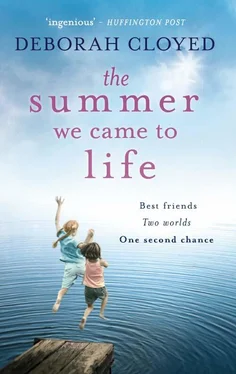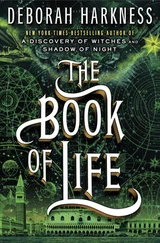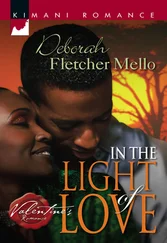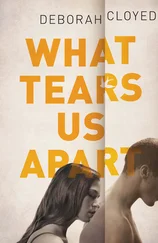A truck flew by on the road, blowing dust and the scent of cattle into my face. My eyes began to penetrate the darkness. Graffiti appeared on rocks lining the highway. My arms broke out in goosebumps. That meant people lived in these mountains. Or bandits. Was that the sound of pebbles falling or scrambling feet? I suddenly felt exposed, like an action hero surrounded by invisible bad guys in the bushes.
“Everybody get back in the cars!” I said. “Now!”
Cornell’s eyes found mine through the rear car window, startled. Lynette lifted her head and I saw fear scurry across their faces.
Arshan, though, looked like he didn’t hear me at all. He had Jesse and Isabel wrapped up in his arms snugger than cellophane and if I didn’t know better I’d say he looked almost happy. Certainly he looked like he had no intention of letting go. For the first time, I got a glimpse of what losing Mina must’ve been like for him. She’d left him all alone like me.
It was cruel the things that could happen to you in an instant. The way people could be ripped from your arms like mice snatched by eagles.
I felt the two Samanthas ready to argue again. There was something Mina had told me once, something she’d said.
But there wasn’t time. I hurried back to the car and tapped Arshan gently on the shoulder. In a daze, we all took our seats as before.
As the cars’ engines startled the silent air, I sank back into my seat and stared down the darkness. Soon, I thought. The internal civil war had to end and I had to figure out what the hell I was going to do. Stay lost or be found.
Lakehouse, Rappahannock, VA, 1991
“Want some more lemonade?” Eleven-year-old Isabel stood on the dock.
I looked up at her, the sun shining high in the sky above her head. She had a hand on her hip, waiting impatiently. “Come on, Kendra. Come with me.”
Kendra looked up, embarrassed. She was drawing hearts around two initials overtop the advertisements in her YM magazine. I tried to see what it said, and Kendra tried to hide it unsuccessfully with her hands.
KJ + A
Only one letter for the boy. “Adam!” I laughed. The boy staying next door to the lake house Jesse was renting that summer.
Kendra glared at me, and Mina giggled. She was floating on her back in the water but could hear us apparently.
“He’s cute,” Isabel said, to take Kendra’s side. She put out her hand with pink nail polish on her fingers.
Kendra took her hand and followed Isabel up the big hill to the house to ask for more pink lemonade.
I picked up the magazine, and flipped forward and back a few pages. Kendra had drawn, like, twenty hearts that morning.
“Hey, Sam?”
“Yeah?” I said, tracing over the amazingly symmetrical hearts.
Mina swam close to the dock, next to my knees.
“What?” I said, and raised my eyebrows.
Mina changed her mind and went back to floating. She looked up at the sky, completely crammed full of drifting fluffy clouds. I watched them, too, for a second, admiring how they arranged themselves into faces and animals and a hundred other pictures of life.
“What do you think is the point?”
“Of what, Em?”
“Any of it. All of it. Boys. School. Life.”
I looked at my feet under the water, thought how delicious the coolness felt, especially when miniature waves lapped at my ankles and left spots to be tickled by the wind. “To have fun?” I suggested.
Mina splashed me.
“I don’t know, Em. But we got lots of time to figure it out, right?”
Mina didn’t answer. She dove under the water and disappeared. I watched in amusement, but she stayed under a long time. I scanned up and down the channel, at the green water and the trees across the way.
Mina surfaced next to my feet, yanking them hard. I almost fell in and then I let myself fall in, until I came up face-to-face with Mina, grinning. My toes squished into the mud on the bottom and I made a “yuk” face. Mina laughed the way she always did at me, benevolently amused.
“I think,” she said, and waited for us both to recover from laughing. “I think the point is to find soul mates.”
I looked at the magazine on the edge of the dock and grinned. “You mean boyfriends?”
Mina crinkled her eyebrows. “I guess, but I was thinking more like us. Don’t you think soul mates are people who understand how you see things, maybe because they’ve known you so long, or maybe just because they understand all your bad parts and love you anyway? I think a soul mate makes up for everything you’re missing.”
“Well, then, if you put it that way—you are definitely my soul mate. So now we can just have fun?” I climbed the dock ladder and then pushed off with my feet and did a backflip into the water. I opened my eyes underwater and watched the flurry of particles dance through the green, moss-colored water.
When I came back up, Mina was laughing, but a different laugh from her repertoire, a sadder one. “But don’t you think there are many soul mates, in case we ever lost each other?”
I looked up at the house and saw Kendra and Isabel walking back with the lemonades, two in each hand. Mina followed my gaze and watched them. She nodded. She lifted her hand and waved. Isabel waved in a way that made Mina laugh, and we could see Kendra scold her for spilling.
Mina touched my shoulder, so I would look over. “I’m just saying, Sam. There’s a lot of people in the world. There must be lots of soul mates.”
I was wounded. “But—”
“Lemonade!” Isabel interrupted us with pink frosty glasses, and Mina’s face told me the discussion was over.
IT WAS ANOTHER HOUR BEFORE WE CROSSED over the bridge into Tela, and wound our way down a dirt road to the beach house. We arrived by trial and error, going back to look for a “right at the old Coca-Cola sign,” per Ana Maria’s instructions, and a “left after thatched-hut bar.”
Both cars pulled into a dusty driveway. The headlights showed a large but basic clapboard wood house.
And a slender, barefoot black man sitting on the front porch.
That must be the caretaker, I thought, and waved out my window. Ana Maria had told me about a watchman who lived in a cement house nearby and maintained the vacation home while her family was away. Which, I only now realized after the car accident, must be because the area was unsafe. The beach house was surrounded by the local Garifuna population, whom I was excited to photograph. Their culture blended Indian blood with that of shipwrecked slaves and had grown to inhabit the coastline of Central America. They were supposedly an easygoing and self-sufficient people, but modern world poverty allows few exemptions from discontent and rebellion.
The watchman was lanky and tall, ancient-looking yet nimble. His skin was like shiny wet pebbles in the headlights of the cars. He had his hands in his jeans pockets and stood perfectly still, watching and waiting.
I got out and went to him with my hand outstretched. “Soy Samantha. Mucho gusto,” I said, it dawning on me as I did that he might only speak the local Garifuna language.
The man hesitated then smiled a perfunctory smile of yellowed ivory teeth. He held out his hand. It was smooth and warm.
“Ahari.”
Ahari walked toward the Ford. Arshan got out of the driver’s seat. He looked at me for assurance. I had never mentioned a caretaker.
“You guys, this is Ahari. He’s the watchman.”
Arshan popped the trunk in response.
Ahari grabbed two armfuls of groceries and started for the house.
The vacation club piled in on his heels. It looked like any typical beach house, sandy and worn, with mismatched chairs and tables and paperback books and board games piled along the walls. Truthfully, I had expected something far more luxurious based on Ana Maria’s stories from college. I hoped nobody would feel let down.
Читать дальше












